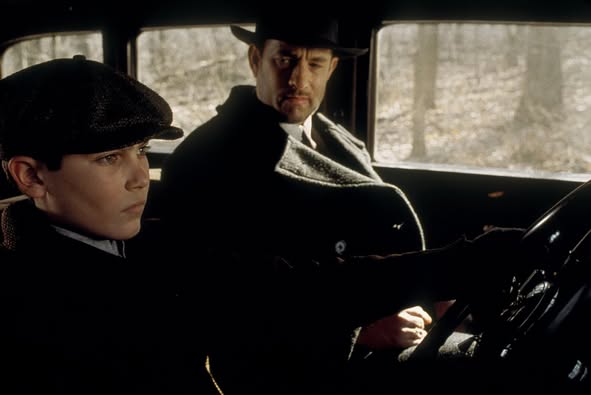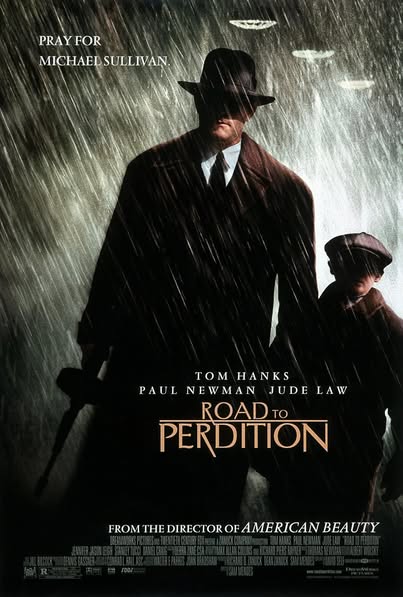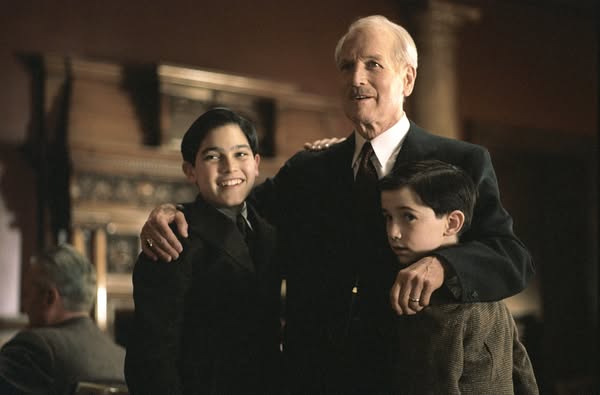Road to Perdition (2002)

Road to Perdition (2002) is a compelling crime drama that intricately weaves themes of loyalty, vengeance, and the search for redemption within the context of the American mob. Directed by Sam Mendes, the film showcases a rich narrative that explores the complex dynamics of father-son relationships against a backdrop of violence and moral ambiguity. With its stellar performances and a hauntingly beautiful score by Thomas Newman, Road to Perdition stands out as a poignant exploration of the consequences of choices made in a world defined by crime and betrayal.
Set during the Great Depression, the story follows Michael Sullivan Sr. (Tom Hanks), a hitman working for the Irish mob in Chicago. He is fiercely loyal to his boss, John Rooney (Paul Newman), who acts as a father figure to him. The film opens with a stark portrayal of Sullivan’s life as he navigates the treacherous waters of organized crime while trying to protect his family from the darker aspects of his profession. However, his world is shattered when his son, Michael Jr. (Tyler Hoechlin), witnesses a brutal murder, thrusting them into a perilous journey of survival.
At its core, Road to Perdition is a story about the bond between fathers and sons. As Sullivan attempts to shield Michael Jr. from the violent world he inhabits, the film deftly explores themes of paternal love, sacrifice, and the desire for a better life. The relationship between Sullivan and his son becomes the emotional backbone of the narrative, highlighting the internal conflict Sullivan faces as he grapples with his past and the violent legacy he wishes to leave behind.
The film is distinguished by its genre-blending approach, combining elements of crime drama with a coming-of-age story. Mendes expertly crafts a narrative that moves beyond mere gangster tropes, delving into the psychological and emotional depths of its characters. The film’s pacing is deliberate, allowing viewers to fully engage with Sullivan’s moral dilemmas and the weight of his decisions. As the story unfolds, the stakes escalate, culminating in a gripping climax that forces both Sullivan and Michael Jr. to confront the consequences of their actions.

Visually, Road to Perdition is breathtaking. Cinematographer Conrad L. Hall employs a muted color palette that evokes the somber tone of the era. The film’s cinematography captures the stark contrasts between the beauty of the American landscape and the darkness of Sullivan’s world, enhancing the emotional weight of the narrative. Each frame is meticulously composed, contributing to the film’s overall atmosphere of tension and melancholy.

The performances in Road to Perdition are nothing short of extraordinary. Tom Hanks brings a nuanced portrayal of Michael Sullivan, balancing the character’s ruthless profession with his deep-seated desire to protect his family. Hanks captures Sullivan’s internal struggle, making him a sympathetic figure despite his violent actions. Paul Newman’s portrayal of John Rooney is equally compelling, embodying the complexities of loyalty and betrayal that define his character’s relationship with Sullivan.

The film also features standout performances from Jude Law as the sinister hitman Harlen Maguire, whose pursuit of Sullivan and his son adds an additional layer of tension. Law’s chilling portrayal serves as a reminder of the relentless nature of the criminal world, further complicating Sullivan’s quest for redemption.
In conclusion, Road to Perdition is a masterful exploration of loyalty, sacrifice, and the quest for redemption set against the backdrop of organized crime. Through its rich storytelling, exceptional performances, and stunning visuals, the film transcends the typical gangster genre, delving into the emotional and moral complexities of its characters. Mendes’ direction, combined with a haunting score, creates a cinematic experience that lingers long after the credits roll, prompting reflection on the choices we make and their lasting impact on our lives and the lives of those we love. Road to Perdition remains a powerful testament to the enduring bonds of family and the pursuit of redemption in a world fraught with danger and moral ambiguity.











